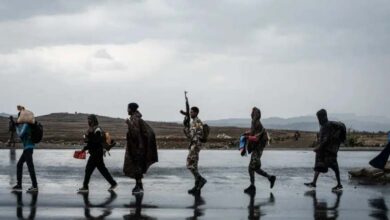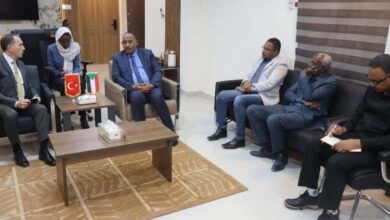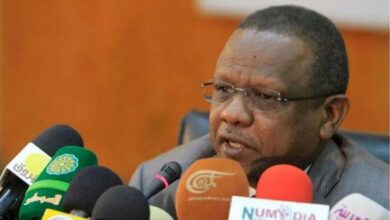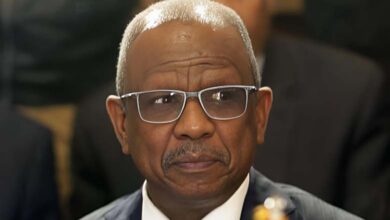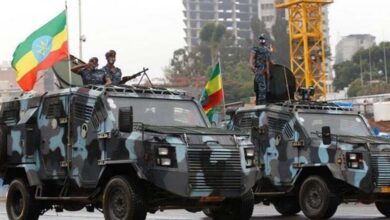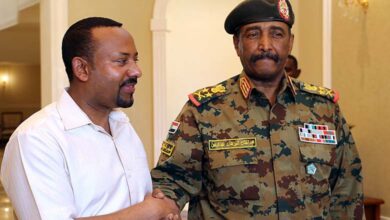Sudan: Al-Burhan Rejects Dialogue Initiatives
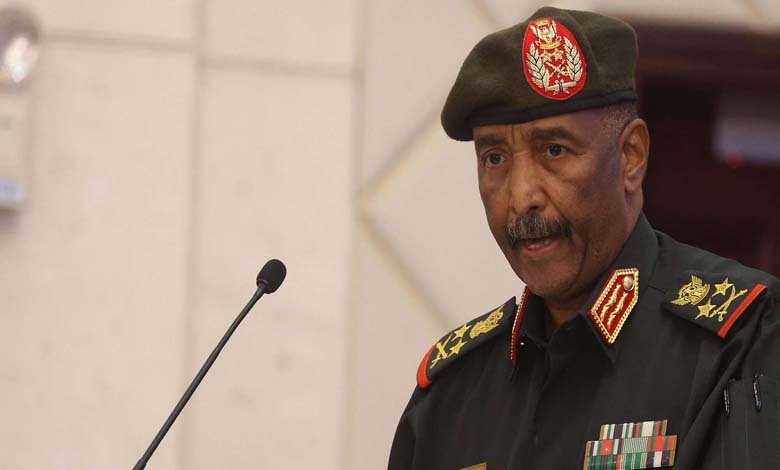
Sudanese politicians have attributed the Sudanese army’s rejection of numerous dialogue and negotiation initiatives with the “Rapid Support” forces, sponsored or organized by the African Union, aimed at ending the war in Sudan, to the Union’s classification of the Sudanese army’s commander, Abdel Fattah al-Burhan, as a party to the conflict and not as the head of the Sudanese state.
Since last January, the Sudanese army has rejected several initiatives proposed by “Taqaddum” or by other international or regional parties and organizations to stop the war in the country.
Politicians also find that another reason for “al-Burhan” and his Islamist allies’ refusal to interact with several “Taqaddum” initiatives to sit at the same table with the Sudanese army commander and the leader of the Rapid Support Forces, Mohamed Hamdan Dagalo “Hemeti,” is related to the hopes al-Burhan himself had for achieving victories over the Rapid Support Forces. However, this contradicts the reality on the ground with “al-Burhan” losing vast areas in Sudan.
Politicians consider the rumors about the army agreeing to hold a meeting between al-Burhan and Hemeti, coinciding with an initiative issued by the African Union’s Peace and Security Council last Saturday, as a “maneuver” linked to the preparation of a military force by the United Nations in Sudan, if no signs of negotiation between “al-Burhan” and “Hemeti” appear in the coming weeks.
High-level sources within “Taqaddum” confirmed that the rumors about the army agreeing to a meeting with “Taqaddum” in parallel with the announcement of the African initiative, which were attributed to unofficial pages, are nothing more than a “maneuver” with the international community. The army will adjust its “intent” over time to avoid appearing as if it is rejecting negotiations or not committed to them depending on the changes.
Unofficial pages attributed to “Taqaddum” published that the Sudanese armed forces had agreed to hold a consultation meeting with them to stop the war, which was officially denied by the spokesperson of the Coordination of Civil Democratic Forces “Taqaddum,” Bakri Al-Jack.
Sudanese academic and activist Al-Nour Hamad highlighted some factors he sees as reasons for the army’s rejection of initiatives and negotiations in the past months to find ways to end the war.
He explained that one of the main reasons lies in an issue related to the African Union, which is associated with the continent’s Peace and Security Council. The Union suspended Sudan’s membership since the coup that took place on October 25, 2021, making the Sudanese government unrecognized by the Union.
He added that “therefore, any mediation for al-Burhan to meet with the leader of the Rapid Support Forces would be as the head of one of the conflicting forces and not as the head of the Sudanese state,” which has led al-Burhan to refrain from engaging with multiple initiatives, whether by the Transitional Sovereignty Council or international and regional efforts.
El Noor pointed out that one of the main reasons the military has also refused to negotiate is the current battlefield situation, which has resulted in losses and the loss of territories after military defeats against the Rapid Support Forces. The latter were ready from the outset of the war to sit with army commanders to reach negotiated solutions.
He emphasized that over the past months, the military has seen that its military field position would not make it strong in negotiations. This has led them to prolong the war, hoping to improve their military situation or achieve military victory, neither of which are currently available to the army.
El Noor believes that recent reports of the army agreeing to negotiations could be interpreted from several angles, including coordination of some kind between international and regional forces, including the United States and the African Union, to exert more pressure on the warring factions within Sudan. This aims to reach an agreement as soon as possible given the current humanitarian situation.
He continued by stating that there are views regarding the possibility of al-Burhan changing or modifying his stance on negotiations, based on recent statements by the U.S. envoy to Sudan, Tom Perriello, who mentioned a three-week deadline. If the parties do not meet and reach a negotiated solution within this timeframe, other measures could be taken, including the formation of an international force under the African Union and United Nations umbrella to intervene in Sudan, thereby creating a new reality.
Meanwhile, Ibrahim Zareeba, a member of the Founding Conference for Change (Taqadom), stated that efforts to coordinate with al-Burhan for initiatives to end the war have varied since last January and have continued until recently.
He recalled that in January 2024, there was an agreement signed between Taqadom and the leader of the Rapid Support Forces. At the same time, Taqadom requested a meeting with the armed forces commander, who did not agree to this meeting.
-
The Muslim Brotherhood Promised al-Atta Leadership of the Army after Ousting al-Burhan… Details
-
From Iraq and Lebanon to Yemen and then Sudan… Al-Burhan Tilts Iran Militias in Africa
Zareeba pointed out that al-Burhan‘s rejection signifies a rejection by the Islamists and elements of the previous regime, as the revolution and change programs are based on dismantling the structure of the old regime and completely removing Islamists from the scene. This was reflected in the coup against the constitutional document that stipulated their exclusion, and the same occurred with the framework agreement that defined the political process in Sudan, without the presence of elements from the previous regime or the National Congress Party.


